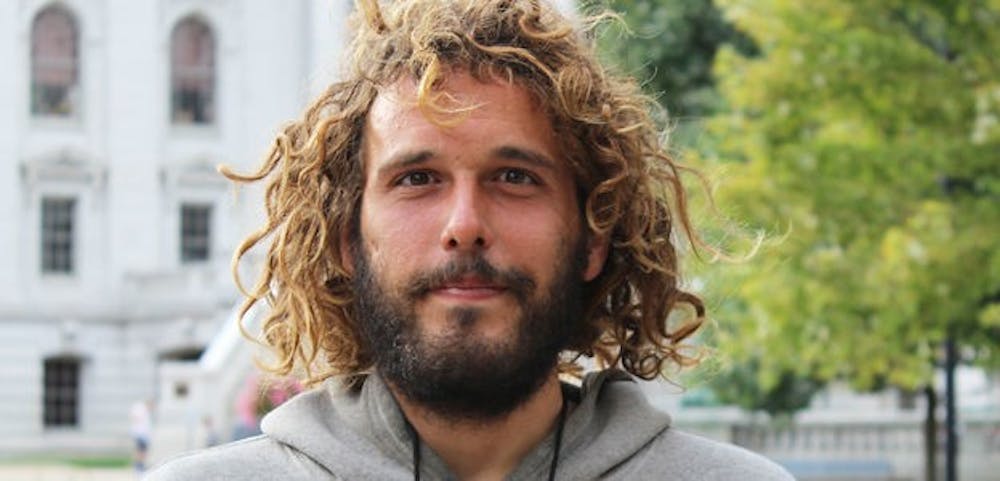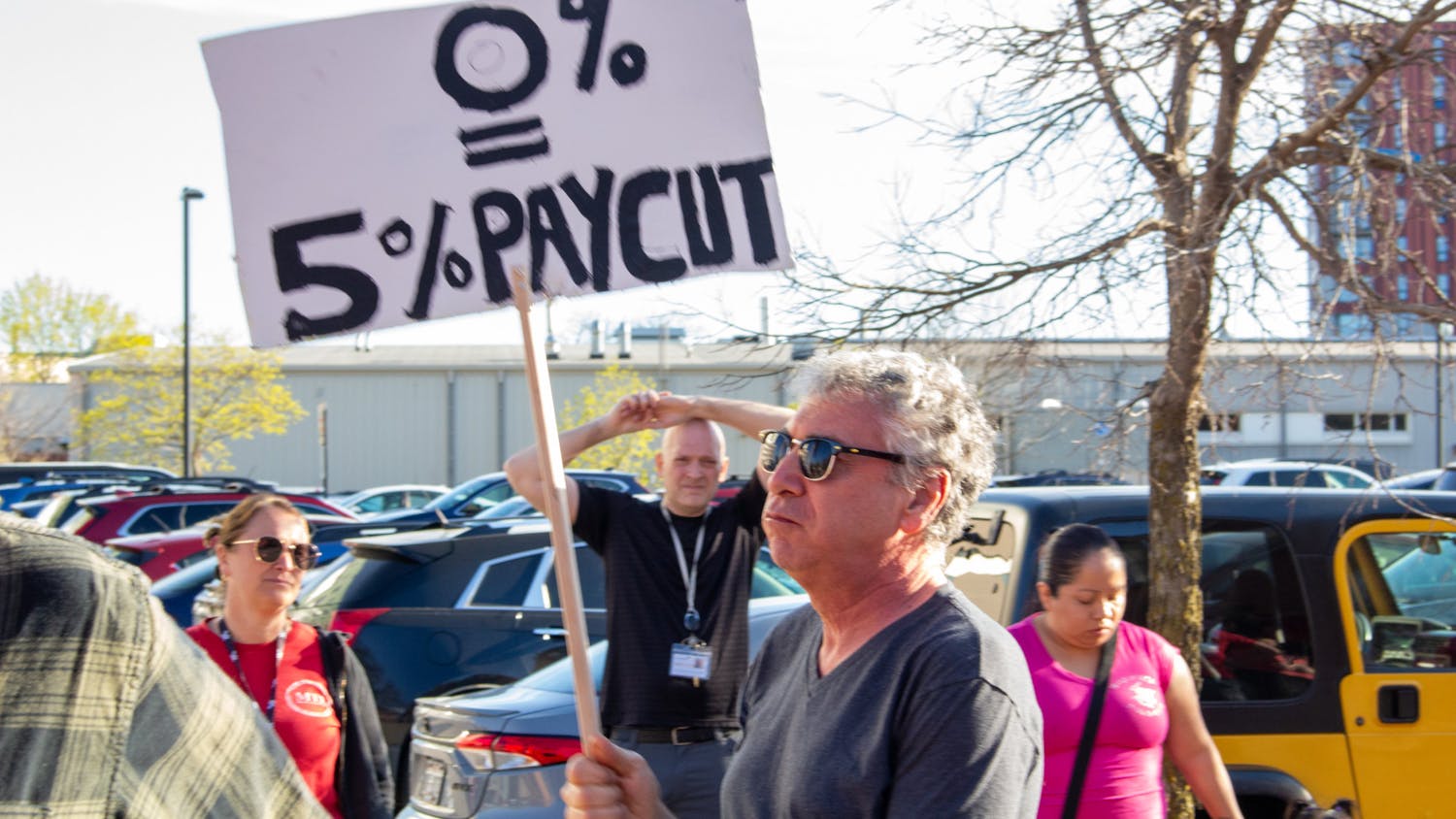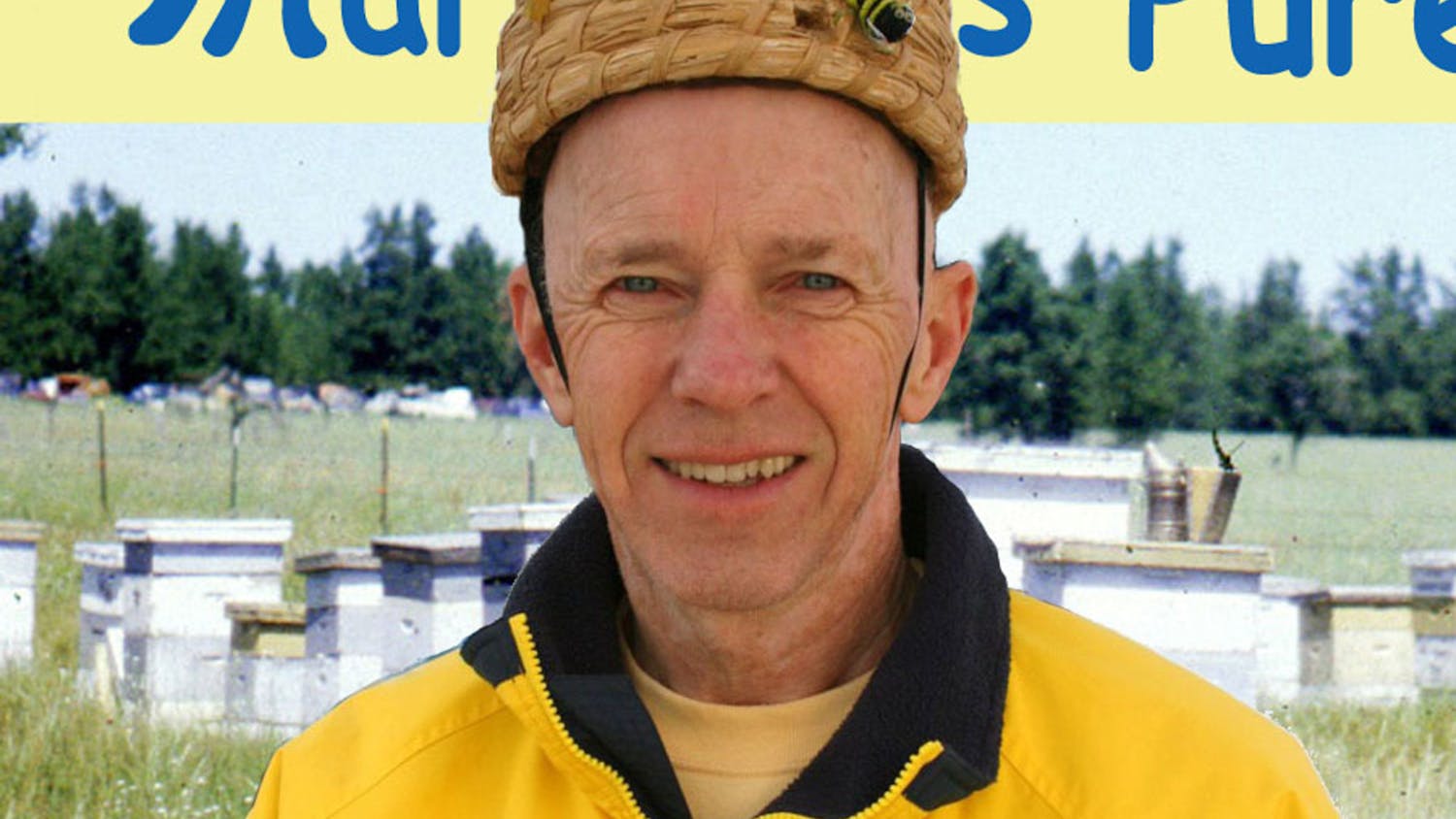A somber look hangs from John Thomas’s face as he leans against a street lamp, selling copies of Street Pulse to pedestrians. I approach him, nervous he will turn down my requests for an interview as multiple people already had, but the notion delights him. A wide smile quickly chases the shadows away from his face as he divulges, with astounding honesty, the details of his past and present circumstances.
Thomas first became homeless in 2005 after a mental health program he was enrolled in at the time failed to place him in adequate housing. Thomas, diagnosed with schizophrenia and bipolar disorder as a teen, struggled with drug addiction for several years after becoming homeless, a habit that led to his incarceration.
“It took me five years in prison to recognize that ain’t the life,” Thomas said. “So when I got out in 2012, I made the best of myself.”
He got a job with Street Pulse, Madison’s homeless cooperative newspaper.
Street Pulse vendors purchase their copies for 25 cents and resell them for a dollar apiece, keeping 100 percent of the profits they generate. Thomas speculated he earns anywhere from $40 to $80 per day.
He said he tries to be out selling papers by 6 every morning and sometimes does not turn in until as late as 2 a.m., with breaks staggered throughout the day. This has been a victorious summer for Thomas, who said he has not used heroin or crack cocaine in the past two months, despite the daily temptation he faces.
“I knew that if you become dependent on that stuff then it starts being like your God,” Thomas said. “But it’s very hard once you get hooked, especially with supporting the habit when you’re on the streets.”
When Thomas makes enough money to buy a hotel room, he does. Other nights, he settles for the benches of State Street or Capitol Square.
“There’s no way I can get another job, I’ve got too many felonies on my record. Some people say to me, ‘Go get a job,’ but I do have a job. This is the only job I could get,” Thomas said. “I wish people would understand that I’m out here to help myself.”
If he could have any job, surprisingly, he would return to the Department of Corrections. Not as a prisoner but as an officer.
“I know this sounds crazy but I really want to go to school for criminal justice,” Thomas said. “When I go back to the DOC I don’t want to be wearing green … I want to show them I can become something.”
Full Transcript
John Thomas
Age: 32
DC: “When did you first become homeless?”
JT: “The first time I became homeless was back in 2005. I was mistreated by a mental health program. The mental health program was called the [Program of Assertive Community Treatment] program. They mistreated me by leaving me on the streets when I had enough money to get a place. They wouldn’t help me get a place, so I ended up on the streets. And I did go to prison for a while from 2004 to 2005.”
DC: “Do you mind if I ask what for?”
JT: “I was incarcerated for burglary and that was due to the fact that I used to have a using habit. I was using crack cocaine and, at the time, it was my life. My life consisted of getting high almost every day. But then, I crashed in 2007. I got a burglary charge in 2007 and I was incarcerated for robbery and threat of force. After I was in prison, it took me five years in prison to recognize that ain’t the life. So when I got out in 2012, I made the best of myself. I got re-hired at Street Pulse, but I wouldn’t stop using, that was the thing. But then I stopped in 2013. I turned over a new leaf.”
DC: “What made you stop?”
JT: “See, I hated the old me. I did five years, I feel like that’s enough. I learned my hard lesson. I haven’t been incarcerated since 2012, no charges since 2012, not even a ticket since 2012. [At the beginning] of 2014, I got an apartment but I wasn’t able to keep it because I was being nice to those that fed my habit, so I went back into using. These last couple months have been kinda rocky because I haven’t used.”
DC: “When was the last time you used?”
JT: “Probably two months ago. I got that apartment through the Willy Street [Single Room Occupancy]. I was using there, but I wasn’t trying to use all that much. But I was feeding my own habit, people that would come over would feed my habit. But then I got into heroine real bad. But then I quit, I went cold turkey because I told myself that ain’t the way I want to go, because people are saying that if you become dependent on that stuff then it starts being your God. Well I stopped using this summer and I haven’t used since. But it’s very hard once you get hooked, it’s very hard. Especially with supporting the habit when you’re on the streets… It’s very expensive.”
DC: “How often are you out here as a vendor for Street Pulse?”
JT: “Practically almost everyday.”
DC: “How much do you make in a given day?”
JT: “Mmmmm… 40 to 80 dollars.”
DC: “You do not have an apartment right now, correct?”
JT: “No, I don’t. I live in hotels. When I get enough for a hotel, I’ll go to Best Western or Hilton. I didn’t get one yesterday… no, I did have one yesterday! Yeah I stayed at the Campus Inn.”
DC: “What happens when you don’t get enough for a hotel?”
JT: “I sleep outside. It’s not that bad right now. I’ll sleep on benches on Capitol Square or sleep on benches on State Street or go to the park and just lay down and fall asleep.”
DC: “Okay.”
JT: “It’s very hard to keep up Street Pulse. There are vendors who will stand out here eight, nine hours a day and make nothing.”
DC: “How long do you usually stand out here?”
JT: “I mean, Capitol Square, it’s a money jackpot. People always give me money for the paper. There’s different spots where I stand. See, Street Pulse, obviously it can wear you out if you stand out here like 12 hours a day. My position is to get out here around 6 in the morning, work til 8, leave, come back out at about 3 in the afternoon and work until 5, maybe 6, come back out and work from 8 p.m. until around 2 in the morning.”
DC: “Is there a lot of revenue at 2 a.m.?”
JT: “Oh yeah. There is. I mean, there’s bars. People go to bars and then they tip you good when they come out. You know, they’re drunk, they really don’t know what they’re doing. But that’s a good way to take advantage of the Street Pulse. When you work that hard, at 2 or 3 in the morning, sometimes you don’t get a drive. It all depends, you know?”
DC: “What happens when winter comes and the weather gets brutal?”
JT: Actually I’m thinking about going to California this winter. That’s where I’m originally from.”
DC: “Were you born there?”
JT: “Yes I was.”
DC: “How did you end up in Madison?”
JT: “Abusive family. I moved here in 1994.”
DC: “How old were you?”
JT: “Thirteen. I’m Thirty-two now.”
DC: “Do you maintain any contact with your family?”
JT: “Yes I do. My mom is dead. My dad is dead. My sister and me, that’s the only ones left. I got some inheritance from my mom that is coming, so I won’t be homeless anymore.”
DC: “When are you supposed to get the inheritance money?”
JT: “Um, I have to check on it. It will probably be 2015 or 2016 before I get it.”
DC: “Where is your sister right now?”
JT: “She’s over in Milwaukee. My mom owned a house in Milwaukee so it was willed to me and my sister. So I did own half a house, but then I gave it to my sister due to the fact that I didn’t want to get thrown off SSI. I’m on Supplemental Security Income for mental disability. I’m mentally ill, I have Schizophrenia and Bipolar Disorder, so it’s a struggle for me, the state of myself, with all these users trying to get high. I don’t get high outside, not anymore. When I got my place, I stopped.
DC: “You mean the apartment you had in 2014?”
JT: “Yeah. But when I got my own place, that was a downfall for me. I shouldn’t have done what I had done to get kicked out. I got kicked out because I was using in the complex and there was another lady that was living in room 9 that would hook me up with heroin, hook me up with crack. It was crazy and still is crazy, and people still use that. You get somebody out and get some new guy and the same thing is gonna happen. If you put a drug addict into a drug place, that’s what’s gonna happen”
DC: “So how did you lose the apartment?”
JT: “I was evicted. They just ended my lease because I had too many overnight guests. [The landlord] said he would give me a good reference for a new apartment. I’m really trying to save up for an apartment, but if I get this inheritance I’m gonna buy a house. If I get the money before the winter time I’m gonna get a house in Mount Horeb. I don’t know where its gonna lead me because you can’t predict the future, but you can hope for the best.”
DC: “Are you a little nervous?”
JT: “Yes. Yes I am. I’m kind of nervous that I turn out to be a wreck.”
DC: “How do you plan to avoid that?”
JT: “How I plan to avoid that is, and I’ve always wanted to do this, I know it sounds crazy but I really want to go to school for criminal justice. I want to go to college. I just want to feel what its like to be in the position they were in when I was incarcerated, to get their perspective. Because I’m the criminal. But what is it like for them to go through what they go through? In other words, when I go back to the Department of Corrections I don’t want to be wearing green. I don’t want to do that. I want to show them that I can become something.
DC: “What is one thing that you wish people knew about you?”
JT: “I wish people knew I wasn’t trying to pull something over on them. This is the only job that I got. There’s no way I can get another job, I’ve got too many felonies on my record. Some people say to me, ‘Go get a job,’ but I do have a job. This is the only job I could get. I wish people would understand I’m out here to help myself.”
DC: “What do you think people could be doing to help those in situations similar to yours?”
JT: “There should be more low income housing for those that need it.”
DC: “Is there anything else you would like to be included in the article?
JT: “In regards to my life, I was abused as a kid, grew up with PTSD, diagnosed with schizophrenia when I was 16 and diagnosed bipolar disorder around the same time. Then when my mom died this past year, that took a real toll. There has been a lot of trauma in my life. Talking about it kind of wears me out.”






